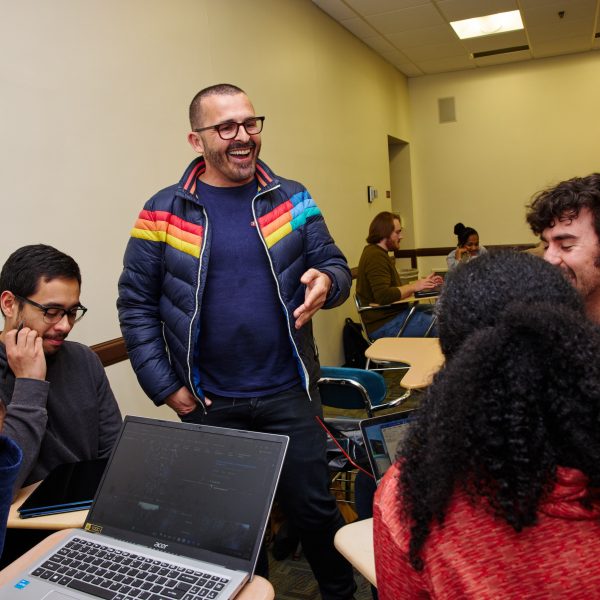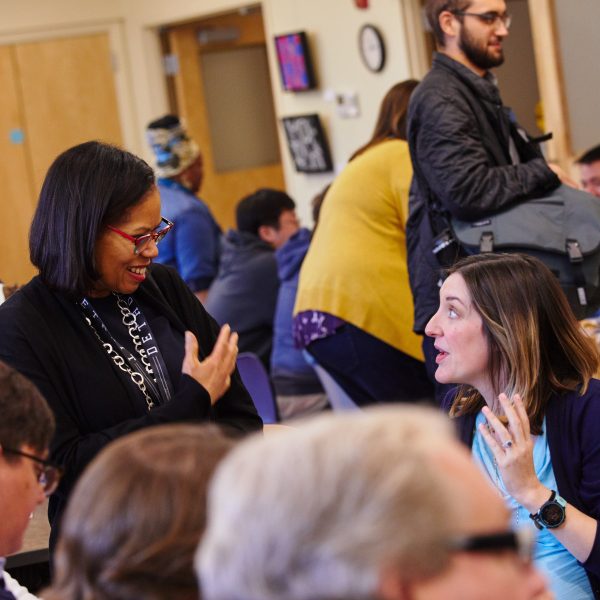Master of Theological Studies (MTS)
The Master of Theological Studies (MTS) degree program invites students and scholars who find fulfillment—and even a sense of spirituality—in the academic study of theology to deepen their knowledge through engagement with the School of Theology’s scholarly community. MTS students engage this degree as a step toward a variety of career paths. Many may be preparing for doctoral studies and an academic career, others for service within a congregation or for deacons orders, and some for work within nonprofit organizations. Recognizing that there is no “typical” MTS student, Boston University School of Theology provides students resources and a flexible curricular structure, allowing them to explore many areas of theological interest. With an exceptional faculty setting high academic standards, students enjoy many opportunities for interdisciplinary study within the School of Theology, across the broader Boston University, and with our partners in the Boston Theological Interreligious Consortium.
The MTS degree is designed to be completed over two years of full-time study. Its curriculum includes core coursework in Sacred Texts & Interpretation, History of Traditions & Institutions, Theology & Meaning-Making, Ethics & Lived Values, along with a Contextual Education experience to help students learn beyond the classroom (18 units). Beyond the core curriculum, MTS students have the flexibility to design their course of study through 30 units of free elective courses from any discipline across the School of Theology’s curriculum. MTS students may also use their elective credits to complete one of the School of Theology’s certificate programs, thereby adding an additional credential to their theological education record.
Please see the full description of the degree program in the STH Bulletin, which also contains admissions and financial information.
The School of Theology offers the following variations of the MTS degree program:
MTS Plan of Study
Plan of Study
MTS Core (18 units)
- First Year Formation in the first fall semester(3 units)
- Sacred Texts and Interpretation (3 units)
- Hebrew Bible or New Testament
- History of Traditions and Institutions (3 units)
- Theology and Meaning-Making (3 units)
- Ethics and Lived Values (3 units)
- One semester Contextual Education internship, project, or travel seminar (3 units)
Free electives (30 units)
Dual Degree: MTS/MSW
The Master of Theological Studies/Master of Social Work (MSW) dual degree program is designed for students who are enrolled, or who plan to seek admission, in the dual degree program that the School of Theology shares with the School of Social Work. The track ensures that courses counting for both degrees are tracked properly and guides the student through both programs efficiently. At present, almost one-third of MTS courses are shared with Social Work, thereby reducing the time it takes to complete both degrees had they been taken separately.
For students who matriculated before Fall 2024, students can retain the MTS Specialization they were admitted into, such as Religion and Conflict Transformation, Transcultural Studies, Theology, Texts and Traditions, Religion and Science, Ecological Theology and Ethics, or Spirituality Studies.
MTS Conversion Plans of Study
All students who matriculated before Fall 2024 must use a MTS Conversion Plan of Study, which they can find on the MTS Program page in the Student Intranet.
MTS Learning Outcomes
The MTS curriculum is shaped by the conviction that religious life in today’s world may be enriched by deep exploration of theological traditions in dialogue with broad understanding of the complexities of our global context. Students have opportunities to prepare for a variety of contributions as religious leaders serving in diverse communities, analyzing religious life in relation to diverse social contexts, and increasing theological knowledge and understanding.
The primary learning outcomes of the MTS include:
- Develop a public theology that draws from textual, historical, and lived faith traditions.
- Grow in capacities to communicate effectively to address the needs of various publics.
- Demonstrate a critical understanding of and creative engagement with the cultural and global realities and structures within which religious and other forms of public leadership are carried out.
- Develop capacities to interpret and to effect positive change within complex institutions.
- Engage across differences (social, cultural, and religious) in ways that foster mutual understanding, learning, and/or collaboration.
- Grow in self-understanding of vocation, capacity for seeking and providing relational support, and habits that will build resilience and sustain wholeness.
MTS Assessment Information
Assessment Process
Assessment Process
First Term: Degree Advising
- Students are encouraged to meet with their faculty advisor.
Second Term: MTS Short Survey
- The student should check in/set up appointment with the Contextual Education office about a placement early in the semester.
- Students take the MTS Assessment Survey (including an uploaded copy of their current transcript) and schedule a meeting with their faculty advisor before registering for the third semester.
- The faculty advisor is expected to read the portfolio materials in preparation for the meeting. The conversation should last between 45 minutes and an hour.
- Following the discussion, the faculty advisor should complete the post-conversation survey electronically.
Fourth Term: Final Assessment Survey
- The ATS Graduating Student Questionnaire must be completed as part of the graduation application.



